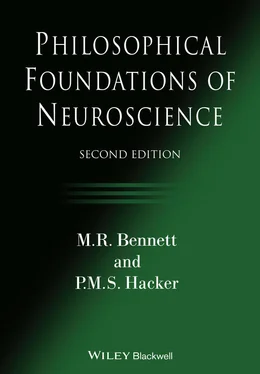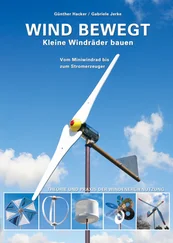It is hard to escape the confines and confusions of the culture in which one finds oneself. The history of philosophy shows that, just as much as the history of science. The central appeal of this book is to throw off the remaining legacy of the Cartesian confusions, first expressed as a duality of mind and body, but latterly expressed as a duality of brain and body. The authors show that, although the first required belief in a non-material substance, while the latter is wholly materialistic, many of the conceptual problems (essentially those of the ‘ghost in the machine’) are the same. For our dualist predecessors the ghost was an actual immaterial substance, for us it is ‘the “I”’ (or ‘inner eye’ or whatever) that ‘sees’ the qualia that ‘form our experience’. This is what may lead us to ask which group of cells, or even which neurone(!), is doing the ‘seeing’. The point here is that simply replacing ‘I’ or ‘inner eye’ by the brain or a part of the brain doesn’t avoid the problem.
The key to understanding the confusions here lies in an analysis of the logical conditions for ascribing mental and psychological properties. This is not easy. It involves one of the most difficult of twentieth-century philosophical ideas, that of the ‘private language argument’: what it is to say things like ‘I feel pain’ or ‘I see red’. I struggled through the ramifications of this argument many years ago before writing my own contributions to the philosophy of biology. I wish I had had the benefit of the relatively easy path that Bennett and Hacker have provided. Even those who fundamentally disagree with their arguments ( and I look forward to seeing them engage in debate) must surely acknowledge that this is a sustained and valuable exposition of an important and influential philosophical position.
Although I would describe that position as philosophically radical (in the correct sense of that word: going back to basic roots and eradicating those that shouldn’t be there), it is often dismissed by scientists as conservative because it may appear to restrict using language in new ways. Yet, they would argue, science cannot advance without doing that. And what better way to achieve it than to start with metaphor or façons de parler , consolidate with dead metaphor (metaphors that become part of everyday language – constructivists argue that that is the way language evolved) and finally end up with a change in our conceptual scheme? Indeed, why not, if that is what will enlighten us, lead us into new conceptual territory, formulate new theories. But there is a simple test for whether that could work in any particular case. For each such metaphorical (or similar) change in use or meaning, or novel piece of terminology (such as ‘qualia’ or ‘memes’), imagine stating its opposite, and then ask whether any conceivable experiment could test empirically between the two. The deep problem for many ‘novel’ concepts and language uses in reductionist approaches is that this test totally fails. The novel use of language is then not so much a scientific as a political or social tool. If you doubt this, try imagining an experiment to test between the existence or non-existence of qualia. Or for whether or not the brain makes representative maps (which are not homunculi incidentally). Or for brain states that ‘explain’ rational thought (rather than being a necessary physical basis for its existence). Surely we should only introduce new terminology where, as with quarks and black holes, we provide the empirical criteria for determining their existence?
Perhaps the problem for many scientists is to imagine what would happen if we abandoned the universality of the reductionist approach. For sure, the nature of science would change. But so it should! We would have to recognize that causation and explanation do not always run upwards from lower to higher levels. And, surely, at a time when we have already come to understand the extent to which causation runs in the opposite direction ( higher-level states in biological systems even influence something as fundamentally lower-level as gene expression), how can we possibly imagine that we will progress without recognizing the validity of explanations at all levels? One of the criteria for determining the level at which explanation succeeds is to ask what can sensibly be ascribed at different levels. It does not make sense to look for explanations at levels lower than that for the applicability of the relevant predicates.
This is particularly true of rational behaviour, including the use of language. The argument is basically very simple. We cannot, coherently, deny our own rationality. Otherwise we would have difficulty meaning what we say or being convincing in saying it, which is precisely what happens in the sad cases of those mentally ill people who nevertheless are aware of, but can’t help, their irrationality. If we really could succeed in ‘reducing’ rational behaviour simply to molecular or cellular causation then we would no longer be able meaningfully to express the truth of what we had succeeded in doing. But, thankfully, no such reduction is conceivable. We know what it is to be rational, and what it is to lose that capacity. That knowledge has nothing to do with the question whether there exist specific and causally sufficient neural states and interactions while I am writing this review, for example. Of course they do. And, if we can discover them, they may well provide a complete explanation for the mechanisms of my brain while thinking and writing. The main claim of anti-reductionism in science is that such a complete explanation of mechanisms at one level does not necessarily explain what exists and happens at higher levels. Indeed we may need to know about the higher levels in order to explain the lower-level data that form an input to the mechanisms involved (which is what must be the case in writing this review! – one of the inputs was my reading this book, but the book is not thereby ‘inside’ my brain).
The most spectacular case of this need for higher-level understanding in modern biology is, of course, the genome, whose sequences will only be understood eventually in terms of higher-level function (genes don’t come with functional names attached – nor do neurones!).
I started my life in physiological research as a fully paid-up member of the reductionist club. In the 1960s you couldn’t get much more reductionist than to discover ion channels in excitable cells and then to simulate their activity in a bottom-up approach. I did for heart cells what Hodgkin & Huxley did for nerve cells. It is through trying to extend this approach to higher physiological levels that I have come to see the conceptual and computational problems that arise in practice. I have written elsewhere on the impossibility of a completely bottom-up reconstruction of living systems. 2
Concurrently I also interacted extensively with professional philosophers (of different schools of thought – including those who would support the reductionist agenda). Coming to adopt an integrationist agenda was not an easy road, either scientifically or philosophically. But it is a far richer position. The integrationist does not deny the validity or immense achievements of successful reduction. For some reason ( political, social, philosophical? ) reductionists seem to need to claim universality for their approach. This book will give them some cause to re-think that position – or so I would hope.
1 1See, for example, D. Noble, ‘What do intentions do?’, in A. Montefiore and D. Noble (eds), Goals, No Goals and Own Goals ( Unwin Hyman, London, 1989) and D. Noble, ‘Biological explanation and intentional behaviour’, in W. H. Newton-Smith and K. Wilkes (eds), Modelling the Mind ( Oxford University Press, Oxford, 1991).
Читать дальше












